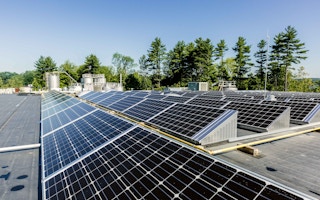2017 was an extraordinary year for global solar power with installations growing 32 per cent to 400 gigawatts (GW) – enough energy to power 280 million homes or 40 billion LED bulbs for a year. It is therefore no surprise that global investments in solar energy outstripped all other renewable energy. With the promise of Tesla’s solar roof and windows manufactured using see-through solar cells, we can expect continued growth in the coming years as the world transitions to low-carbon energy.
To continue reading, subscribe to Eco‑Business.
There's something for everyone. We offer a range of subscription plans.
- Access our stories and receive our Insights Weekly newsletter with the free EB Member plan.
- Unlock unlimited access to our content and archive with EB Circle.
- Publish your content with EB Premium.
According to Zion Market Research, the global solar panel market is estimated to increase at a CAGR of 10.9 per cent between 2017 and 2022 to reach US$57.3 billion. Solar panels typically carry a 25-year guarantee on power degradation as well as a 10-year coverage against defects. Given the extended lifecycles of solar panels, insurers need to play a bigger role to close the protection gap for solar to become ubiquitous.
One key concern is risk ownership: who will honour a warranty in the event a panel fails two decades down the road? Long warranties are especially critical for photovoltaic lenders and investors, as such technology requires a long pay-back period. Providing this kind of warranty can constitute a massive financial concern if proper evaluation and risk management is not done at the onset.
This challenge facing underwriters is exacerbated by the fact that solar panel manufacturing is a nascent industry. With most solar installations being less than 10 years old, there is a lack of historical data, which is needed to understand the risk. At best, the widely-accepted certifications (IEC61215 and IEC61730) provide only a minimum baseline. Without comprehensive reliability standards, underwriters cannot properly assess the dependability of solar panels.
The continual development of solar panel technology also leads to frequent changes in materials, manufacturing processes, and the evolution of solar cells (also known as the “heart” of solar panels), all of which affects an underwriter’s assessment.
In 2013, the Dutch Food and Consumer Product Safety Authority declared that 650,000 solar panels supplied by a manufacturer over three years (2009 to 2012) were a fire risk. These panels were installed throughout Europe and resulted in multiple fires. This serves as a cautionary tale about the potential financial loss and how risk accumulation can adversely affect solar panel insurers. As it is, a 25-year insurance cover also brings with it hefty administrative costs, such as costs for data storage over time with the Bureau of Meteorology and serial number tracking for every piece of equipment.
“
Given the extended lifecycles of solar panels, insurers need to play a bigger role to close the protection gap for solar to become ubiquitous.
Furthermore, solar panels are installed in vastly different operating conditions, ranging from the scorching deserts of Africa to the freezing rooftops of Arizona, with very different standards of maintenance in each location. These factors have led to the growing need for robust guidelines that will can help insurers adequately protect themselves.
Recognising the market gap and challenges that underwriters face in evaluating risk and exposure, reinsurance firm Swiss Re has consulted and collaborated with solar photovoltaic research institutions to develop the Solar Panel Code of Practice (SPCoP).
The SPCoP is an international guideline on risk management and solar panel warranty insurance that goes well beyond existing industry quality standards. It empowers all stakeholders – producers, buyers, investors, banks and insurers – to better assess the long-term quality and reliability of solar panels in the context of insurance.
Setting the best practice for insurers in client segmentation, testing and auditing, the SPCoP aims to address the challenges associated with providing 25-year performance warranty insurance.
The recent Paris agreement on climate change, the growing need to combat air pollution and the rising energy requirements of a growing population call for a systematic and large-scale introduction of renewable energy sources. Solar power has proven to be a key resource going forward and is expected to grow further.
Underwriters must find a way to efficiently manage risks over the extended period of uncertainty that solar panels require.
Jay is Head of China Engineering Underwriting at Swiss Re, responsible for the engineering business of both treaty and facultative for the China region.











